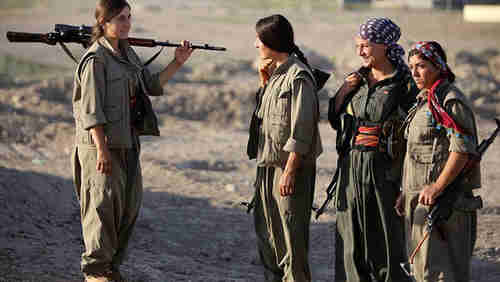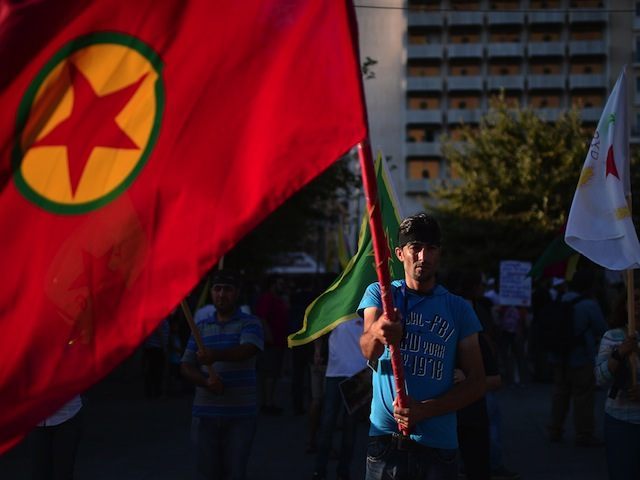This morning’s key headlines from GenerationalDynamics.com
- As Iran rises in the Mideast, Kurds benefit in Iraq and Syria
- Saudi Arabia suffers deadliest terrorism attack in years
- Puerto Rico default triggers selloff in municipal bond funds
As Iran rises in the Mideast, Kurds benefit in Iraq and Syria

Kurdish women fighting ISIS in Iraq (AFP)
While the Iran nuclear deal has thrown the entire Arab world into political disarray, and while Turkey is increasingly at war with the terrorist Kurdistan Workers’ Party (PKK), the “moderate” Kurds are looking at what is apparently the best chance they have had in decades to get a Kurdish state.
The Arabs, Iran, Turkey, the al-Assad Syrian regime, the Kurds, and the U.S. are all involved in the war in Syria and Iraq in one way or another, all with completely different objectives. But they all have one thing in common: They are all fighting the so-called Islamic State (IS or ISIS or ISIL or Daesh) — more precisely, they are all fighting ISIS and using the fight against ISIS as a cover for their own objectives.
The Kurds are one of America’s key allies in Iraq and Syria in the fight against ISIS, and have benefited from airstrikes from the US-led coalition. With the help from these airstrikes, the Kurds have successfully taken control of substantial territory in northern Syria and Iraq, along Turkey’s border.
Furthermore, the Kurds are getting substantial help from Iran. Reports are that Iran convinced the regime of Syria’s president Bashar al-Assad to grant the autonomy and de facto local independence to the Kurds in Western Syria, and Iran convinced the Shia-led government in Iraq to give the a higher level of autonomy to the Kurds in Iraq.
As we wrote in “26-Jul-15 World View — Turkey bombs ISIS targets in northern Syria to set up ‘safe zone'”, the Kurds in northern Syria are separated into two large enclaves, one in the east up the border with Iraq, and one in the west. If the Kurds can unite those two regions, then it can declare the entire region a Kurdish state, possibly including parts of Iraq, southeastern Turkey, and even northwestern Iran.
Even without a Kurdish state, Turkey would face on its southern border a stable and sustainable alliance headed by Iran, with the al-Assad government in Syria, Hezbollah, the Shia-controlled government, and Kurdish forces. This would give Iran control of a strip of land from Iran to the Mediterranean, isolating Turkey from the rest of the Mideast, and almost encircling Turkey with Iran’s allies.
With or without a Kurdish state, this would be intolerable to Turkey. That is why Turkey needs its 110-km wide “safe zone” in northern Syria, separating the two Kurdish enclaves. The announced purpose of the “safe zone” was to provide a refuge to Syrians from ISIS, but that’s not as important an objective as providing a refuge to Turkey from Iran and the Kurds. Geopolitical Monitor and Al Arabiya
Saudi Arabia suffers deadliest terrorism attack in years
A suicide bomber struck a Sunni mosque in the southwestern city of Abha in Saudi Arabia on Thursday, killing at least 13 people, 10 of whom were security or police forces. There have been previous attacks on Shia mosques in Saudi Arabia’s east, perpetrated by the ISIS-linked Najd Province terrorist group. Since this time the target was a Sunni mosque in a city on the border with Yemen, the initial reactions were to suggest that the perpetrators were Houthi terrorists from Yemen, where the Saudis are fighting a war against the Iran-backed Houthis.
However, a previously unknown Sunni terrorist group, identifying itself as ISIS-linked “Hijaz Province,” claimed responsibility for the terrorist attack. The “Hijaz” name is a reference to the historic western part of Saudi Arabia that is home to Islam’s holiest sites of Mecca and Medina.
The attack was devastating, and it was the deadliest attack against Saudi security personnel in years. It is certain to increase demands, both domestically and internationally, for the Saudis to become more heavily involved in fighting ISIS in Syria, possibly putting troops on the ground.
These demands will come at a time when Saudi Arabia, popularly thought to be one of the richest countries in the world, is running out of money, forcing the government to borrow money by issuing bonds. The loss of reserves is caused by a sharp rise in military spending and a collapse in oil prices, the main source of revenue. Saudi Gazette and AP and CNN
Puerto Rico default triggers selloff in municipal bond funds
Individual investors pulled $308 million from municipal bond funds in the last week, in a reaction to Puerto Rico’s failure to make a $58 million debt repayment on Tuesday, putting Puerto Rico in technical default.
Puerto Rico is seeking to restructure its $72 billion of debt, which is widely held because the 10% interest is “triple-tax free,” meaning that you can earn 10% interest every year and not have to pay federal, state or municipal tax on the interest you collect.
In the midst of the growing economic crisis, a severe drought is causing a water shortage, and is forcing businesses to temporarily close, public schools to cancel breakfast service and people to find creative ways to stay clean amid sweltering temperatures. Bloomberg and VOA
KEYS: Generational Dynamics, Iran, Iraq, Syria, Kurds, Turkey, Kurdistan Workers’ Party, PKK, Bashar al-Assad, Hezbollah, Islamic State / of Iraq and Syria/Sham/the Levant, IS, ISIS, ISIL, Daesh, Saudi Arabia, Abha, Yemen, Houthi, Hijaz Province, Puerto Rico
Permanent web link to this article
Receive daily World View columns by e-mail

COMMENTS
Please let us know if you're having issues with commenting.